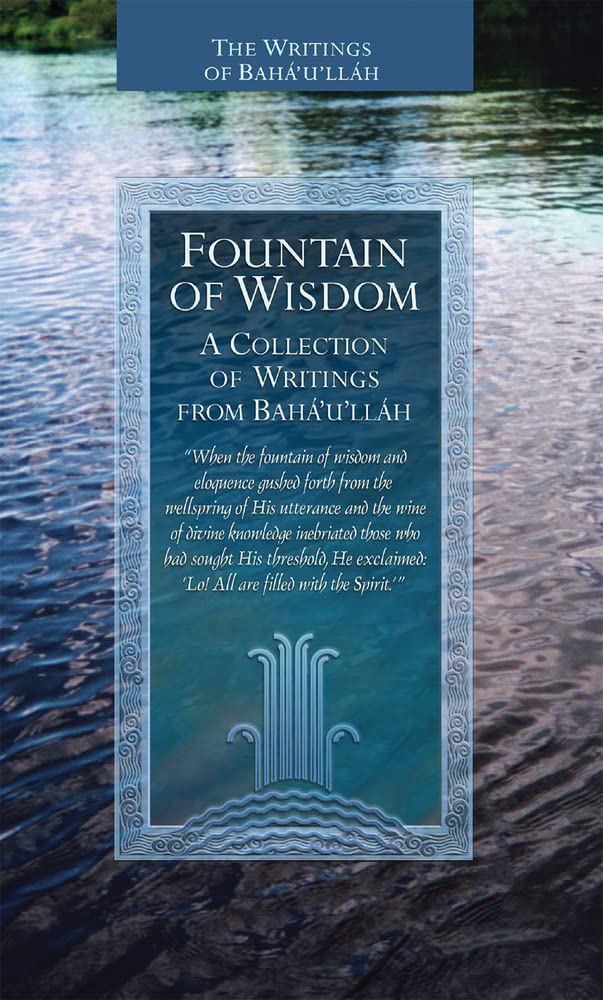The Bahá’í teachings, woven intricately into the fabric of the religious philosophy of its founder, Bahá’u’lláh, offer profound insights that collectively serve as a beacon of hope and enlightenment for humanity. One such compilation of his writings, titled “Fountain of Wisdom,” encapsulates the essence of spiritual and ethical guidance, inviting readers to engage in a transformative journey of introspection and understanding.
The overarching theme of Bahá’u’lláh’s teachings is the unity of humankind. This concept serves as the foundation upon which the edifice of a just and peaceful society is built. The idea posits that regardless of diverse backgrounds, cultures, or beliefs, all people are interconnected. This understanding is not merely a philosophical assertion; it is an urgent call to action. As one delves into the “Fountain of Wisdom,” a shift in perspective is inevitable—a realization that every individual has a role to play in the collective advancement of society.
Another pivotal tenet of Bahá’í teachings is the concept of justice. Within the pages of “Fountain of Wisdom,” the reader encounters exhortations to pursue justice not solely as a societal mechanism but as a spiritual imperative. A justice imbued with love, compassion, and understanding is encouraged, emphasizing that true equity transcends mere legal frameworks. This profound perspective on justice resonates deeply, challenging individuals to reflect on their own actions and interactions within their communities. How can one promote justice through compassionate engagement rather than conflict? Such inquiries are fundamental to the essence of the Bahá’í faith.
The writings articulate the necessity for an educated society, where knowledge and wisdom are revered and pursued. The call for education is not limited to academic prowess but extends to the moral and spiritual realms. Bahá’u’lláh emphasizes that enlightenment conduces to a more harmonious existence, where individuals not only seek to broaden their understanding of the world but also awaken their innate potential. Within “Fountain of Wisdom,” readers are urged to foster a thirst for knowledge that transcends conventional boundaries. The notion of lifelong learning emerges as a vital principle, encouraging individuals to remain inquisitive and intellectually engaged throughout their lives.
The integration of science and religion is another hallmark of Bahá’í teaching highlighted in the writings. This synthesis is articulated as a necessary paradigm for contemporary understanding. Bahá’u’lláh posits that science and religion are complementary forces, each enriching the other. While science provides empirical understanding and technological advancement, religion offers ethical guidance and purpose. The harmonious coexistence of these realms fosters a more holistic worldview. Readers are thus invited to recognize the interplay between scientific inquiry and spiritual contemplation, nurturing a mindset that encourages both practical and spiritual progression.
Moreover, the “Fountain of Wisdom” beckons individuals to reflect on the significance of individual character and virtue. The emphasis is placed on the development of intrinsic qualities such as compassion, integrity, and humility. The cultivation of moral character is presented as essential for personal and societal transformation. This insight is particularly resonant in a world grappling with moral ambiguity and ethical dilemmas. The aspiration towards perfection is not portrayed as an unattainable ideal but as a continuous journey of self-improvement and service to others, compelling readers to assess their personal values and the impact of their choices.
Interspersed throughout the text is a discourse on the transformative power of love. Love, as a central theme, is presented not merely as an emotion, but as an active force capable of uniting disparate individuals and bridging societal divides. The writings eloquently illustrate love’s role in fostering understanding and cooperation among people. This concept challenges readers to actively pursue love as a guiding principle in human interactions, raising questions about one’s capacity to love unconditionally, even in the face of adversity.
The pioneer Bahá’í teachings also address the urgency for global peace and cooperation among nations. This call for unity resonates throughout the “Fountain of Wisdom,” affirming that the survival and well-being of humanity hinge upon collaborative endeavors. Bahá’u’lláh’s vision invokes a collective consciousness that transcends geopolitical boundaries. The teachings address the root causes of conflict, advocating for dialogue over discord and understanding over enmity. Engaging with this perspective inspires curiosity about alternative pathways to resolving contemporary global challenges, prompting readers to contemplate their role in fostering peace.
Furthermore, the writings navigate through the implications of a spiritual and ethical lifestyle. Living in accordance with the teachings of Bahá’u’lláh invites individuals to transcend their personal desires, aligning their actions with the greater good. The pursuit of material success, while often glorified, is presented as a hollow aspiration compared to the fulfillment derived from service to others. This paradigm shift challenges readers to redefine success and consider the legacy they wish to leave behind. The questioning of conventional wisdom unlocks a deeper appreciation for altruism and communal responsibility.
In summation, the “Fountain of Wisdom” serves as an invaluable repository of insights drawn from the Bahá’í writings, offering a treasure trove of guidance on how to navigate the complexities of modern existence. Each teaching embodies an invitation for personal reflection, presenting an opportunity for transformative experiences rooted in unity, justice, and love. The delicate weave of these themes creates a rich tapestry that not only piques curiosity but also engenders a profound understanding of the interconnectedness of all life. Embracing these teachings encourages individuals to engage proactively, rethink their perspectives, and contribute meaningfully to the enigmatic journey of human evolution.
